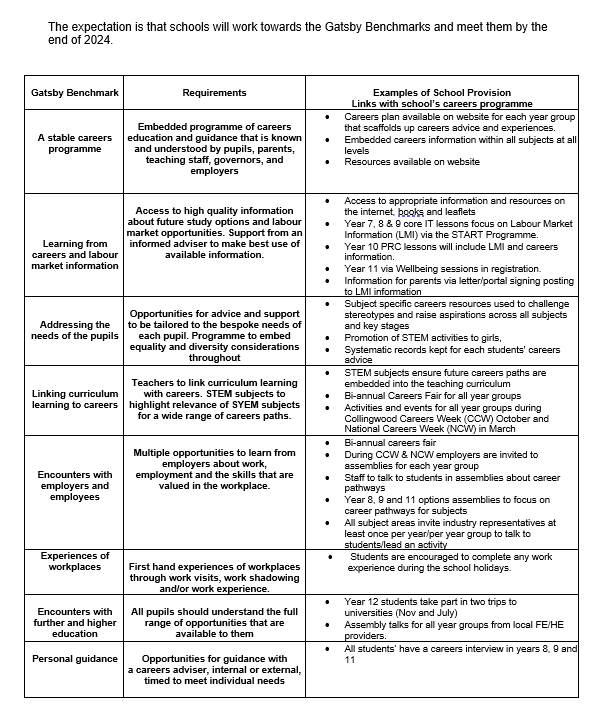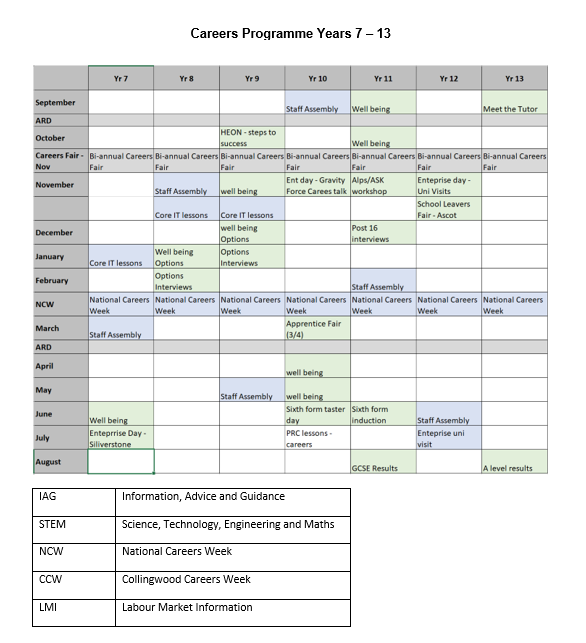Strategy Document
Careers Lead – Emma Clelland
Assistant Principal - Rebecca Woods
A young person’s career is their pathway through learning and work. All young people need a planned programme of activities to help them to make informed decisions about learning and work that are right for them and to be able to manage their careers throughout their lives. Following the Department for Educations document in 2017 ‘Careers Strategy: making the most of everyone’s skills and talents’ the College has developed a range of Careers opportunities that are tightly linked to the Gatsby Benchmarks.
At Collingwood College, we will offer Careers Education to all students in all year groups.
The programme will support them to:
- Develop their knowledge and understanding of the changing nature of work, learning and career;
- Extend their understanding of opportunities in learning and work;
- Make good use of information and guidance;
- Develop and use their self-knowledge when thinking about and making, course and other choices;
- Develop and use the skills they need to review achievements, plan future actions, make decisions, present themselves and cope with change and transition;
- Develop themselves and their ability to explore careers;
- Develop their ability to become independent enquirers, allowing them to take responsibility for managing their own career path;
Guidance
Guidance is provided by the Information, Advice and Guidance Co-ordinator and U-Explore and includes individual and/or group activities. All staff should, when approached by students, respond with appropriate guidance and support. All guidance aims to be impartial, confidential (within procedure guidelines), and responsive to students’ needs and based on the principle of equality. Guidance will follow the Career Development Institute (CDI’s) Code of Ethical Principles.
Curriculum Provision
By the end of Key Stage 3, all students will have:
- A minimum of two encounters with approved providers of apprenticeships and technical education that are mandatory for all pupils to attend;
- Accessed the Collingwood Careers website and web-based resources;
- An understanding of themselves (personal characteristics, abilities, interests, potential, weaknesses and limitations).
- Used the research information about opportunities to help them make choices about post-14 courses and learning programmes;
- Received appropriate advice and guidance on post-14 choices.
- An understanding of how to use Labour Market Information to inform future career pathways.
- Attended at least one careers fair.
- Accessed subject specific careers information within curriculum time.
- Attend a Kidzania (experience through Enterprise days, used U-xplore to research careers, exploring learning styles, skills, action planning and stereotypes.
- Used U-xplore to record details of careers interviews, transferrable skills, employability skills, choices, subject choices.
- Explored destinations, job markets and working environments
By the end of Key Stage 4, all students will have:
- A minimum of two further encounters with approved providers of apprenticeships and technical education that are mandatory for all pupils to attend;
- Enhanced their self-knowledge and career management and other employability skills;
- Used the other resources to investigate future choices including apprenticeship options and explore alternative routes to their goals;
- Accessed advice, guidance and support to help them firm up their choices and think about the implications;
- Accessed information about how to gain experience of work out of term-time;
- A clear understanding of the requirements to continue in Education or Training until their 18th birthday;
- A clear understanding of the importance of achieving a Grade 4/5 or above in English Language and Mathematics;
- Chosen and applied for an appropriate opportunity and, if necessary, financial support;
- Made a back-up plan in case things go better or worse than expected;
- Identified where to get help in the future.
- Attended at least one careers fair.
- Accessed subject specific careers information within curriculum time.
- An understanding of how to market yourself, make applications and examine selection processes
- The ability to record details of careers interviews, exploring risks and rewards, examine money and budgeting and understand the importance of being resilient
By the end of Key Stage 5, all students will have:
- A minimum of two additional encounters with approved providers of apprenticeships and technical education that are optional for all pupils to attend;
- Extended their self-knowledge, career exploration, career management, key and other employability skills;
- Devised a set of personal criteria to help them identify appropriate routes to their goals;
- Accessed information about how to gain appropriate experience of work. Year 12 and 13 students are encouraged to organise their own placements and complete them out of term-time;
- Researched, evaluated, obtained guidance on, chosen and applied for an appropriate opportunity including apprenticeship options and, if necessary, financial support;
- Made a back-up plan in case things go better or worse than expected;
- Identified where to get help in the future.
- Attended at least one careers fair.
- Accessed subject specific careers information within curriculum time.
- Visited two different universities and had the chance to explore alternatives.
- Understand how to make an UCAS or Apprenticeship application.








